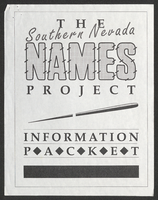Search the Special Collections and Archives Portal
Search Results
Helen Daseler oral history interview
Identifier
Abstract
Oral history interview with Helen Daseler conducted by Claytee D. White on October 09, 2007 for the Boyer Early Las Vegas Oral History Project. Daseler discusses mining work in Colorado, living in Europe, working for the United States government, and opening the Las Vegas Day School.
Archival Collection
Laura Kelly oral history interview
Identifier
Abstract
Oral history interview with Laura Kelly conducted by Cindy Gaylor on February 27, 1979 for the Ralph Roske Oral History Project on Early Las Vegas. Kelly discusses her early life in Boulder City, Nevada, Nellis Air Force Base, and local politics. She also discusses the Civilian Conservation Corps (CCC) in Southern Nevada during the Great Depression.
Archival Collection
Courtney Mooney oral history interview
Identifier
Abstract
Oral history interview with Courtney Mooney conducted by Suzanne Becker on July 30, 2007 for the Voices of the Historic John S. Park Neighborhood Oral History Project. Mooney describes her work as the urban design coordinator for Las Vegas, Nevada. Mooney also discusses the past, present, and future of the John S. Park neighborhood.
Archival Collection

Southern Nevada NAMES Project information packet
Date
Archival Collection
Description
Text
Yolanda Scaggs oral history interview
Identifier
Abstract
Oral history interview with Yolanda Scaggs conducted by Thomas Walker on March 02, 1980 for the Ralph Roske Oral History Project on Early Las Vegas. In this interview, Scaggs discusses air conditioning, the railroad, and atomic bomb testing. Scaggs talks about the growth of Las Vegas, Nevada, specifically the hotels and casinos on the Las Vegas Strip. She also mentions former President John F. Kennedy, mining, and the growth of Henderson, Nevada.
Archival Collection
Deborah Cameron oral history interview
Identifier
Abstract
Oral history interview with Deborah Cameron conducted by Dennis McBride on August 17, 2006 for the Las Vegas Gay, Lesbian, Bisexual and Transgender Archives Oral History Project. In this interview, Cameron discusses the lesbian community in Las Vegas, Nevada, the organization Women of Nevada (WUN), and founding the organization, L Club. She describes other lesbian organizations and clubs that she was a member of and explains why gay clubs were important in forming supportive communities. Lastly, Cameron talks about the disbandment of the L Club.
Archival Collection
Melville Smith oral history interview
Identifier
Abstract
Oral history interview with Melville Smith conducted by Karl Kuopus on February 17, 1977 and February 23, 1977 for the Ralph Roske Oral History Project on Early Las Vegas. In this interview, Smith describes his career working for the City of Las Vegas, Nevada in the Planning and Development Department. Smith discusses city planning, how Las Vegas has changed, and housing in the city. Smith also talks about nuclear weapons tests, his children, and why he moved to Las Vegas.
Archival Collection
Roosevelt Toston oral history interview
Identifier
Abstract
Oral history interview with Roosevelt Toston conducted by Claytee D. White on July 11, 2006 for the Boyer Early Las Vegas Oral History Project. Toston discusses moving to Las Vegas, Nevada in the 1950s and his various careers at the Test Site, Bell Telephone of Nevada, as a television anchorman and cameraman, and the Convention and Visitors Authority to bring conventions to Las Vegas. He also talks about ways African American entrepreneurs might get involved in the convention business.
Archival Collection
J.T. Thomas oral history interview
Identifier
Abstract
Oral history interview with J.T. Thomas conducted by Samuel Greene on February 13, 1979 for the Ralph Roske Oral History Project on Early Las Vegas. In this interview, Thomas discusses his arrival to Las Vegas, Nevada in 1913 in search of job opportunities. Thomas also describes the development of Las Vegas, specifically the increase of hotels and casinos. Thomas then discusses segregation in schools and explains that African Americans were only allowed to live on the West Side of Las Vegas. Thomas later recalls downtown Las Vegas and changes in the state's educational curriculum.
Archival Collection
Pat Skorkowsky oral history interview
Identifier
Abstract
Oral history interview with Pat Skorkowsky conducted by Russell Holmen on March 29, 2007 for the Public School Principalship Oral History Project. In this interview, Skorkowsky reflects upon his career as a teacher and administrator with Nevada’s Clark County School District (CCSD). He discusses the process by which he started working with CCSD as a teacher, and later became an administrator and assistant superintendent. He describes his approach to school administration, his working relationships with parents, teachers, and other administrators, and experiences that shaped his career.
Archival Collection
